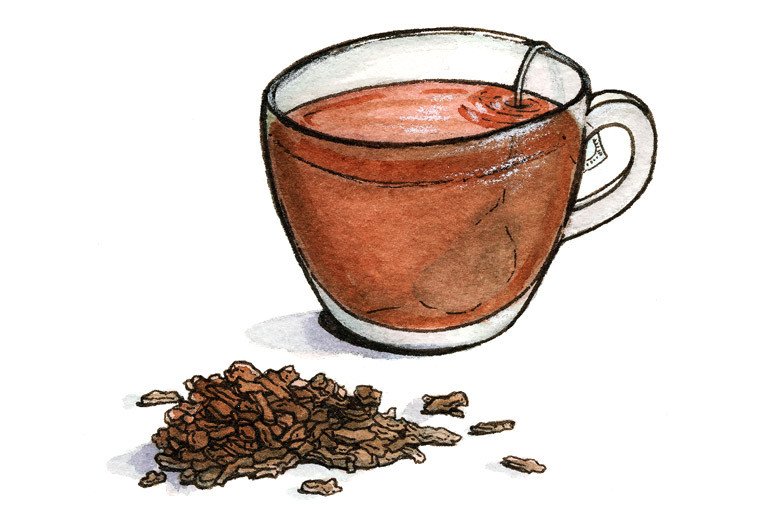
Common Names
- Redbush tea (South Africa)
- Rooibosch (Netherlands)
For Patients & Caregivers
Tell your healthcare providers about any dietary supplements you’re taking, such as herbs, vitamins, minerals, and natural or home remedies. This will help them manage your care and keep you safe.
Although lab studies suggest rooibos tea is rich in antioxidants, studies in humans are very limited.
Lab studies suggest rooibos tea contains compounds that may prevent tumor growth and slow aging, but studies on this have not been conducted in humans. Some compounds isolated from rooibos leaves showed estrogenic activity. Therefore, patients with hormone-sensitive cancers should use caution before taking rooibos.
- To treat skin conditions such as acne, eczema and wrinkles
Although rooibos is used to treat acne, eczema, and to prevent wrinkles, clinical evidence is lacking. - To prevent cancer
Some lab studies suggest rooibos may inhibit tumor growth, but others indicate that rooibos leaves have estrogenic activity. Human studies are needed.
Case report
Liver toxicity and low platelet count: In a 37-year-old patient about to undergo laparoscopic surgery. The cause was identified as long-term large amounts of rooibos daily. The procedure was switched to open surgery instead, to reduce the number of medications that would have to be metabolized by the liver.
Elevated liver enzymes: In a 42-year-old woman who drank large amounts of rooibos tea. Liver enzyme levels normalized within 1 week after stopping ingestion.
Special Point:
Rooibos tea has antioxidant effects and may interfere with the action of certain chemotherapeutic agents.
For Healthcare Professionals
Prepared from the dried leaves of the rooibos plant native to South Africa, rooibos tea has grown popular in western countries because it is low in caffeine and rich in antioxidants, especially the polyphenols aspalathin and nothofagin (1). It does not contain any catechins, the major flavonoids present in green and black teas (2).
In vitro and animal studies have shown that rooibos can modulate immune function (3) (4), exhibit anti-inflammatory effects (5), and prevent oxidative stress (7). Animal studies suggest that it may prevent chromosomal aberrations (8) and tumor mutagenesis (9) (10). In other lab studies, topically applied rooibos protected against microsomal lipid peroxidation and reduced tumor formation (1) (11), and a rooibos tea extract appeared to protect against radiation damage (12). However, these effects have not been confirmed in humans.
Preliminary data suggests rooibos may inhibit angiotensin-converting enzyme in healthy volunteers (2), which may benefit cardiovascular health. However, studies in humans are very limited and further research is needed.
Rat studies suggest that prolonged exposure to rooibos may affect the reproductive system, impair fertility, or affect liver and kidney function (25). In humans, a few cases of liver toxicity with long-term use or ingesting large amounts have been reported. Because compounds isolated from rooibos leaves demonstrated estrogenic activity (22), patients with hormone-sensitive cancers should use caution before taking rooibos.
- Skin conditions
- Aging
- Cancer
Rooibos was shown to enhance the activity of glutathione-S transferase and UDP-glucuronosyl transferase in rat livers (11) (16), allowing cells to protect against oxidative stress, and to reduce the effects of hepatocarcinogens. A study of oxidative stress in rats found that serum superoxide dismutase and urine 8-hydroxy-2’-deoxyguanosine (8-OHdG) concentrations (as markers for DNA damage) were significantly reduced following administration of rooibos (17). Some studies have shown that the non-oxidized teas have greater antimutagenic effects compared to the oxidized forms. This is probably due to reduction in total polyphenol content with oxidization (11) (18) (19). The anti-inflammatory effects of rooibos are thought to be due to its inhibition of COX-2 enzyme (5).
Rooibos also modulates immune function: It induces higher IL6, IL10 and IFN-gamma levels and increases cell-mediated immunity (3); and increases IL2 levels while suppressing IL4 (4).
In other studies, rooibos significantly decreased glucocorticoid levels in rats and steroid metabolite ratios linked to metabolic disorders-cortisol:cortisone in humans and CORT:testosterone in rats (23). Hot water-soluble solids from fermented rooibos inhibited adipogenesis and influenced adipocyte metabolism, suggesting a role in preventing obesity (24).
Case reports
Hepatotoxicity and thrombocytopenia: In a 37-year-old presurgical patient about to undergo a laparoscopic appendectomy. The cause was identified as long-term large amounts of rooibos daily. Open appendectomy under a spinal anesthetic was subsequently deemed to be the better option, as the use of multiple medications that have hepatic metabolism with laparoscopic surgery would be eliminated (27).
Elevated liver enzymes: In a 42-year-old woman who drank large amounts of rooibos tea (21). Levels normalized within 1 week after stopping ingestion.
Liver injury: In a 63-year-old patient admitted for jaundice after consuming rooibos tea. Liver tests returned to normal after discontinuing consumption (28).
- CYP3A substrate drugs: In animal studies, rooibos tea induced CYP3A and may reduce serum levels of these substrate drugs (26). Clinical relevance has yet to be determined.
- Tacrolimus: In a 38-year-old woman with acute myeloid leukemia who underwent bone marrow transplantation, excessive rooibos tea consumption (more than 2 litres a day) reduced the concentration of tacrolimus, resulting in the development of graft-versus-host disease (29).